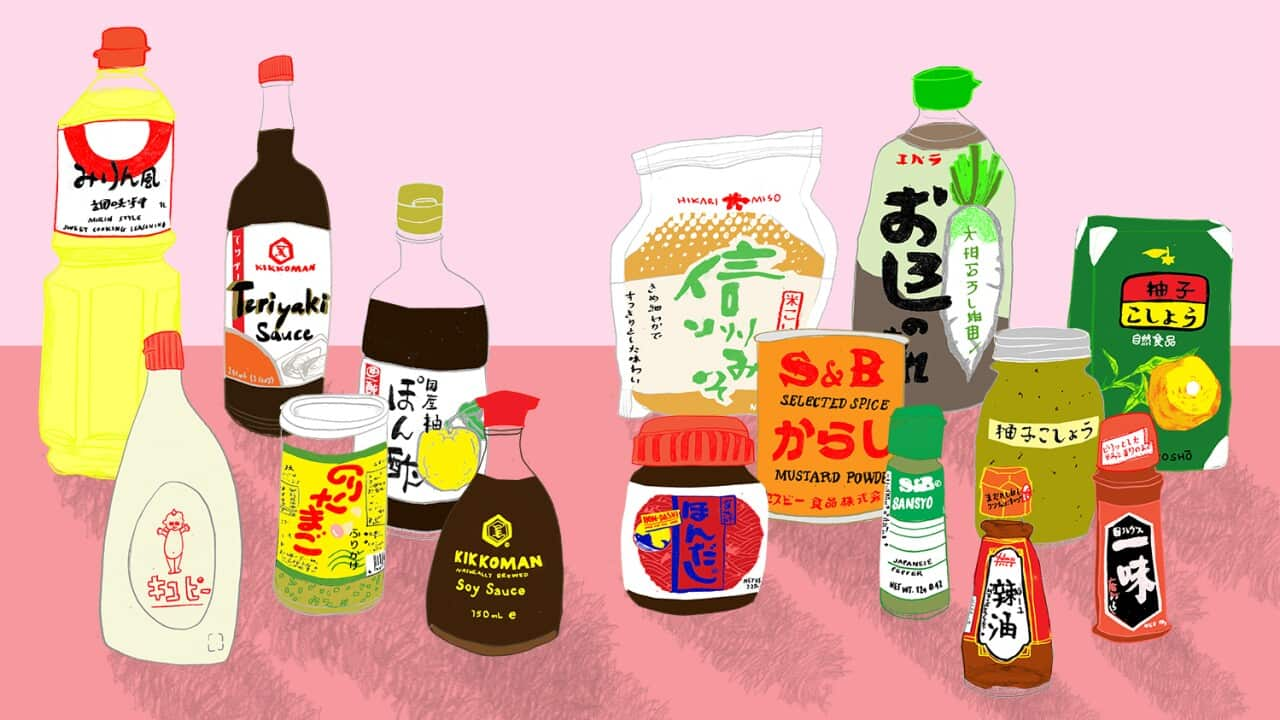From afar it might appear as a hot-dog bun, but get closer and you'll see the coppe pan is a uniquely Japanese take on the sandwich.
The coppe pan (or koppe pan, as it's often written) starts with a fluffy white bread roll. "It's a different type of bread than the one you find in Melbourne," explains 's head chef Yutaka Kurimoto.
"Japanese bread has a high water rate, which makes it really soft and fluffy. It's also a bit sweeter than usual bread. It's a great combination with both savoury and sweet food." Coppe pan was popularised after World War II as a food ration and was later introduced in school lunches after the war. It's still part of some school lunches to this day and available in most convenience stores. "Japanese people grew up with coppe pan," says Kurimoto.
Coppe pan was popularised after World War II as a food ration and was later introduced in school lunches after the war. It's still part of some school lunches to this day and available in most convenience stores. "Japanese people grew up with coppe pan," says Kurimoto.

The agepan feels like a doughnut; soft on the inside and slightly crispy and sweet on the outside. Source: Audrey Bourget
In recent years, trendy shops have banked on the nostalgic appeal of coppe pan by selling gourmet versions of it with all sorts of fillings.
There's now a shop in the basement of Melbourne Central, Coppe Pan Japanese Bakery. Owners Charles Pai and Keiichi Watariguchi have recruited Kyoto-born Yutaka Kurimoto, who came from Japan to head the kitchen. Here, your coppe pan can be filled with things you'd expect like , fish katsu or . It can also be a glorious carb fest with Neapolitan pasta, , or .
Here, your coppe pan can be filled with things you'd expect like , fish katsu or . It can also be a glorious carb fest with Neapolitan pasta, , or .

Head chef Yutaka Kurimoto and co-owner Charles Pai. Source: Audrey Bourget
Both Pai and Kurimoto recommend the yakisoba 'pan' (meaning 'bread' in Japanese). Soba noodles are fried with yakisoba sauce, cabbage, onions and capsicum before they’re placed in the bread roll and topped with pickled ginger.
It's in Japanese manga so it's how foreigners recognise it."
"Most customers are surprised when they see the coppe pan, but sometimes they recognise the yakisoba pan. It's a very typical, famous one. It's in Japanese manga so it's how foreigners recognise it," says Pai. You can also find prawn katsu and egg salad, and scrambled egg, teriyaki tofu and sausage katsu at Melbourne Central.
You can also find prawn katsu and egg salad, and scrambled egg, teriyaki tofu and sausage katsu at Melbourne Central.

Coppe Pan Japanese Bakery is on the lower ground of Melbourne Central, next to the train station’s entrance. Source: Audrey Bourget
"The pan itself is a bit sweet so it brings a new taste with savoury food. It's softer compared to European bread so it's a different sensation too," says Pai.
If you'd rather keep things on the sweet side, your coppe pan can also come filled with a sweet spread like cream or strawberry jam.

The fruit, katsu chicken and tamago sandos. Source: Audrey Bourget
All of the pans
While the coppe pan is the star (it's in the name, after all), the bakery is also about all things pan. All the bread is made on site, and you can even buy a whole cubic loaf to take home.
Currypan is also on the menu as is agepan. The former is a deep-fried bread coated in panko and filled with a mixture of ground wagyu and Japanese curry sauce. Agepan is a lightly fried version of the same bread used for coppe pan, which is then coated in sugar and kinako (roasted soybean flour). "The texture of agepan is like a doughnut because it's fried. It's quite spongy and moist in the middle, but the outside is crispy. With the powdery sweet coating, it’s very tasty," says Pai.
Agepan is a lightly fried version of the same bread used for coppe pan, which is then coated in sugar and kinako (roasted soybean flour). "The texture of agepan is like a doughnut because it's fried. It's quite spongy and moist in the middle, but the outside is crispy. With the powdery sweet coating, it’s very tasty," says Pai.

The currypan is filled with wagyu mince and Japanese curry sauce. Source: Audrey Bourget
The sandos (crustless, of course) have been especially popular since the opening of Coppe Pan Japanese Bakery. Take your pick between chicken katsu, tamago, egg salad or the eye-catching fruits and whipped cream.
While only a few items like the matcha tiramisu are gluten-free at the moment, Kurimoto is hard at work on a gluten-free version of his bread.
Melbourne Central, Lower Ground
211 La Trobe Street, Melbourne
Sun – Sat 10 am – 7 pm | Thu – Fri 10 am – 9 pm
EXPERIENCE JAPAN THROUGH FOOD

Japanese fruit sando










